Table of Contents
One of the more controversial topics in the world of self-actualization is the use of psychedelics. So do you need a psychedelic experience to begin overcoming the self? No, but it can certainly help.
The psychedelic experience’s reputation has become a bit tarnished over the years in no small part due to their irresponsible overuse. However, psychedelics have been used throughout human history to great effect in lessening the effects of ego and gaining a new perspective in ways that few other methods are able to boast. Misuse has caused psychedelics to become discredited and caricatured, which is unfortunate as these can be important tools for many people.
While psychedelics are certainly not for everyone they can be a powerful tool for self-actualization when used properly. This includes careful study of both the theory and the practice of psychedelics.
Below are a number of quotes from some of the leading lights of psychedelic research and mysticism. The point is less to “sell” you on the notion that a psychedelic experience is necessary and more to frame the experience in the proper context. Psychedelics are for obtaining insights into the self. They are not for “partying.” They can more properly be thought of as belonging to the same class as meditation or yoga than narcotics.
Quotes About Psychedelics
Alan Watts
“If you get the message, hang up the phone. For psychedelic drugs are simply instruments, like microscopes, telescopes, and telephones. The biologist does not sit with eye permanently glued to the microscope, he goes away and works on what he has seen.”
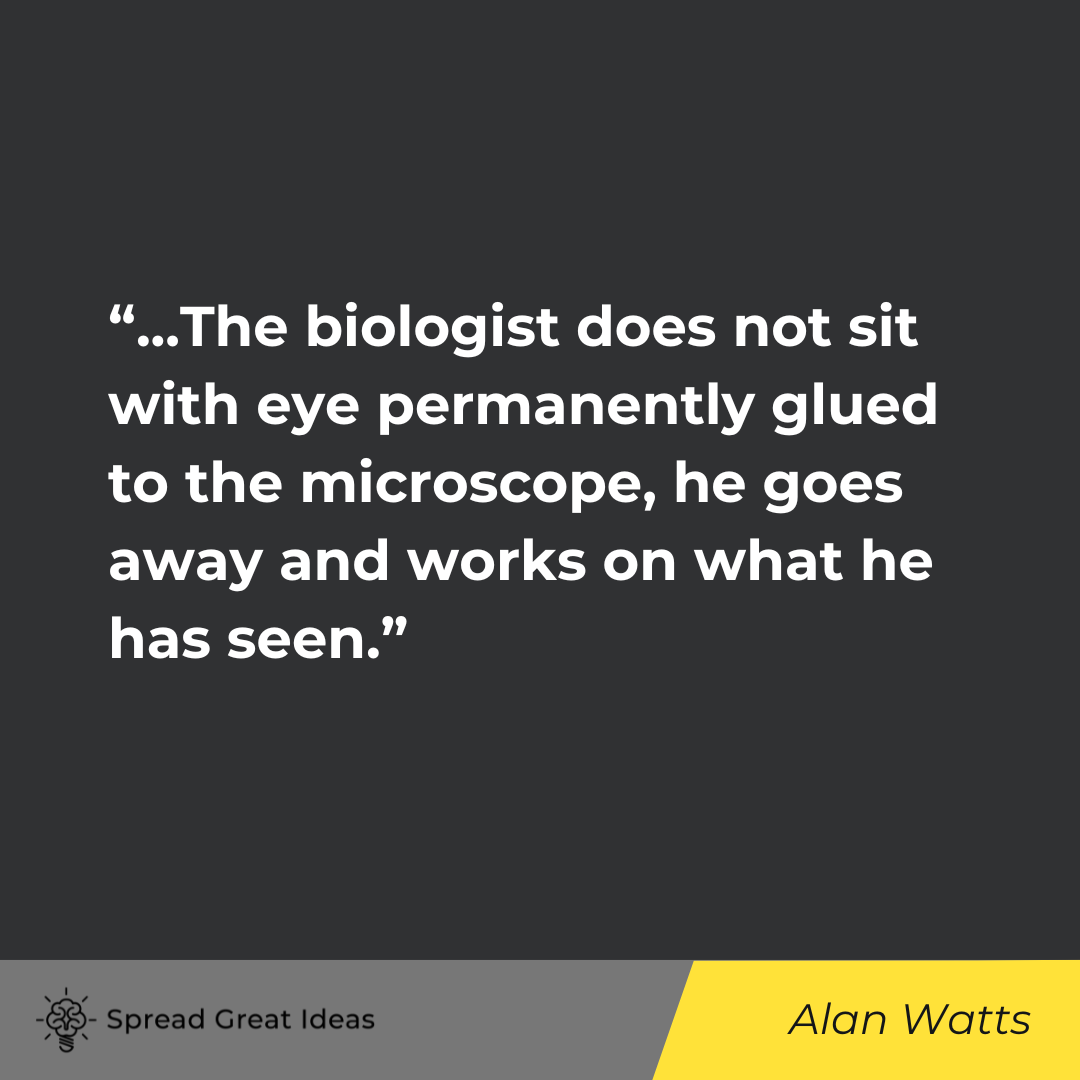
In this poignant quote by Alan Watts, the metaphor of psychedelic drugs as instruments, akin to microscopes and telescopes, is vividly portrayed. Watts suggests that once the message or insight is received through these substances, one should metaphorically “hang up the phone” and integrate the experience into their life rather than continuously seeking it. Drawing parallels to a biologist who doesn’t remain fixated on a microscope but applies newfound knowledge, Watts advocates for using psychedelic experiences as catalysts for personal growth and understanding, urging individuals to explore, reflect, and then actively apply the insights gained in their journey towards self-discovery.
Stanislav Grof
“Psychedelics, used responsibly and with proper caution, would be for psychiatry what the microscope is for biology and medicine or the telescope is for astronomy.”
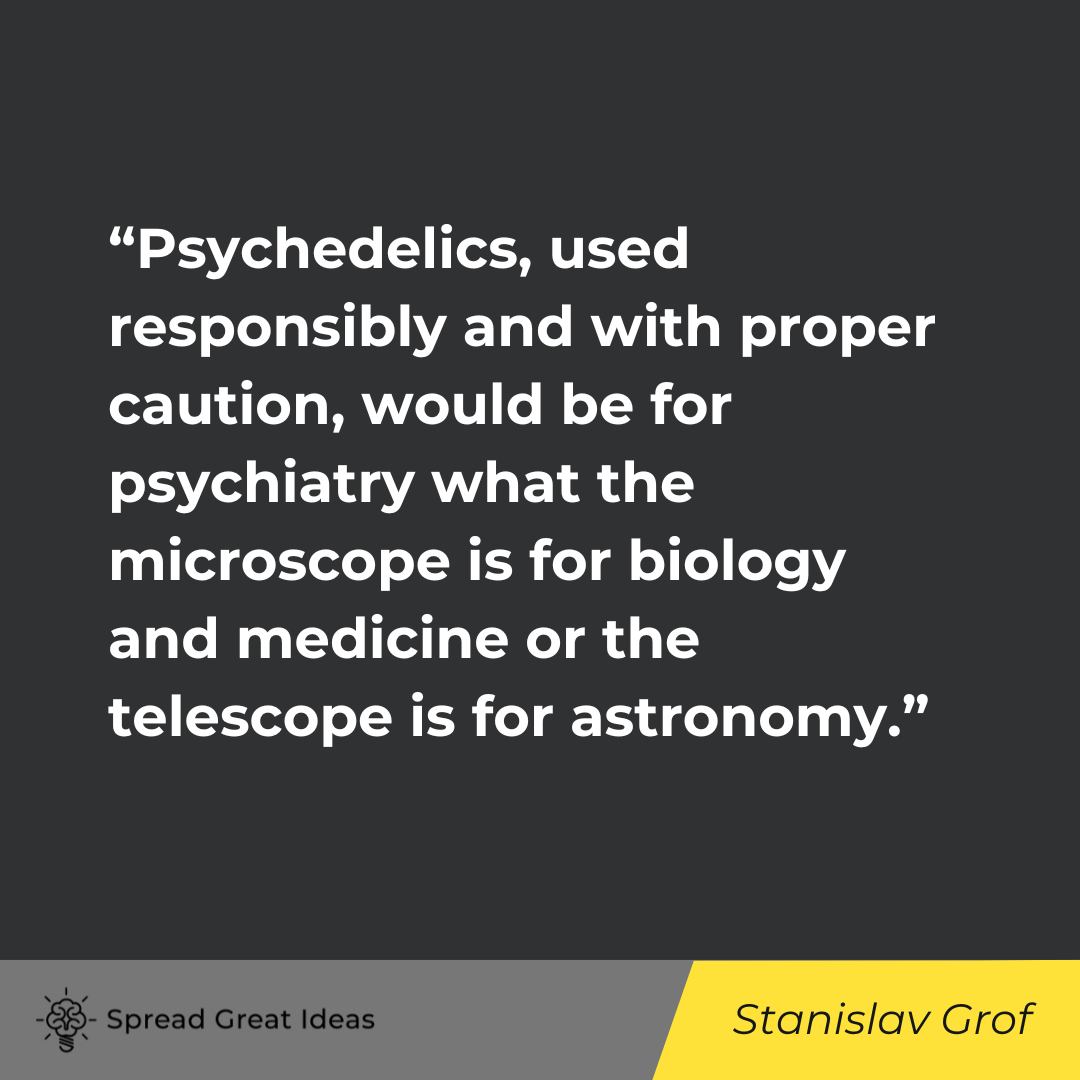
Stanislav Grof’s quote encapsulates the transformative potential of psychedelics within psychiatry. Drawing parallels to the indispensable tools of biology and astronomy, he posits that psychedelics, when approached responsibly, could revolutionize mental health treatment. Just as microscopes unveil the mysteries of biology and telescopes expand our understanding of the cosmos, psychedelics have the capacity to illuminate the depths of the human psyche. With proper caution and guidance, Grof suggests that these substances hold promise as powerful therapeutic tools, offering profound insights and healing opportunities for individuals grappling with psychological challenges.
John Lennon
“Whenever in doubt, turn off your mind, relax, and float downstream.”
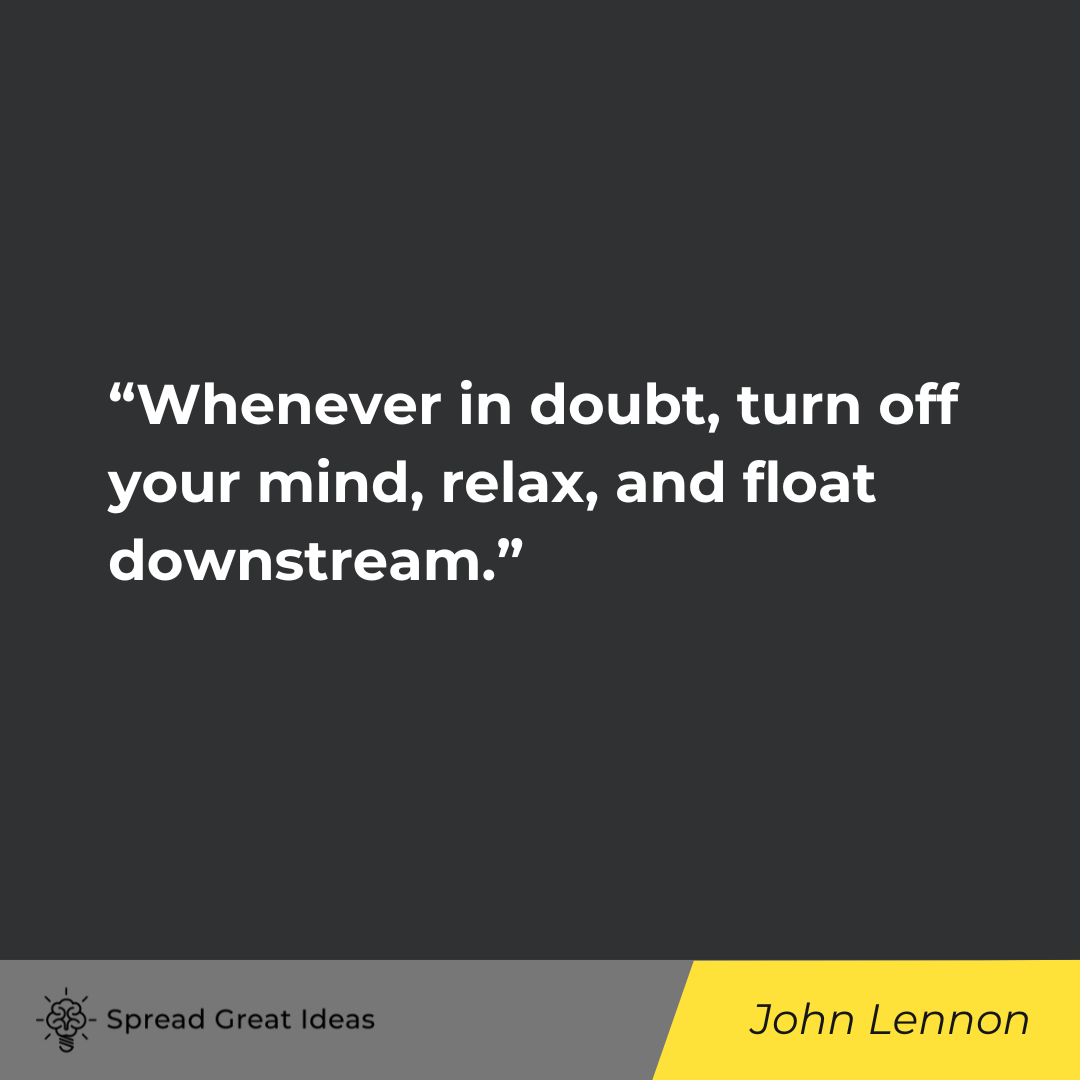
John Lennon’s quote encapsulates a profound wisdom in simplicity. When confronted with uncertainty or confusion, he suggests a remedy that’s deceptively simple yet deeply impactful: turn off your mind, relax, and let yourself drift with the flow of life. In essence, Lennon advocates for surrendering to the present moment, releasing the grip of overthinking, and embracing a state of tranquil acceptance. By encouraging a mental shift away from anxious rumination and towards serenity, Lennon offers a pathway to finding solace and clarity amidst the turbulence of uncertainty, reminding us of the power of letting go and allowing life to unfold naturally.
Terence McKenna
“When we look within ourselves with psilocybin, we discover that we do not have to look outward toward the futile promise of life that circles distant stars in order to still our cosmic loneliness. We should look within; the paths of the heart lead to nearby universes full of life and affection for humanity.”
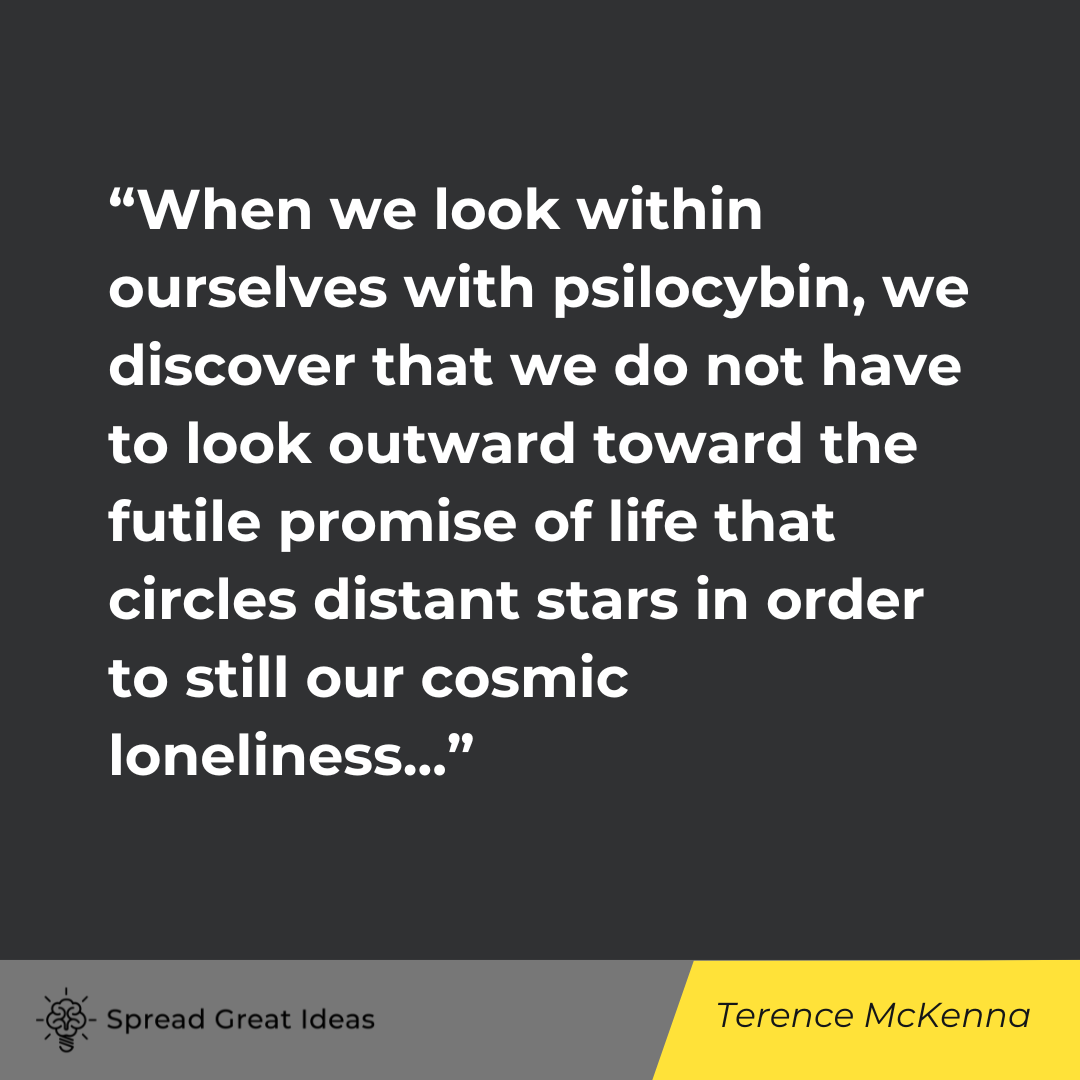
Terence McKenna’s quote delves into the profound revelations brought forth by psilocybin, emphasizing the inward journey as the key to alleviating existential loneliness. Rather than seeking solace in distant realms or external promises, McKenna advocates for introspection as the gateway to discovering interconnectedness and meaning. Through psilocybin, he suggests, we unravel the rich tapestry of our inner selves, finding vast universes brimming with life and love. By embracing the paths of the heart, we unearth a wellspring of empathy and connection, fostering a deep appreciation for humanity’s collective experience. McKenna’s words echo the transformative potential of inner exploration, inviting us to embrace the boundless universe within.
Terence McKenna
“Psychedelics are illegal not because a loving government is concerned that you may jump out of a third-story window. Psychedelics are illegal because they dissolve opinion structures and culturally laid down models of behavior and information processing. They open you up to the possibility that everything you know is wrong.”
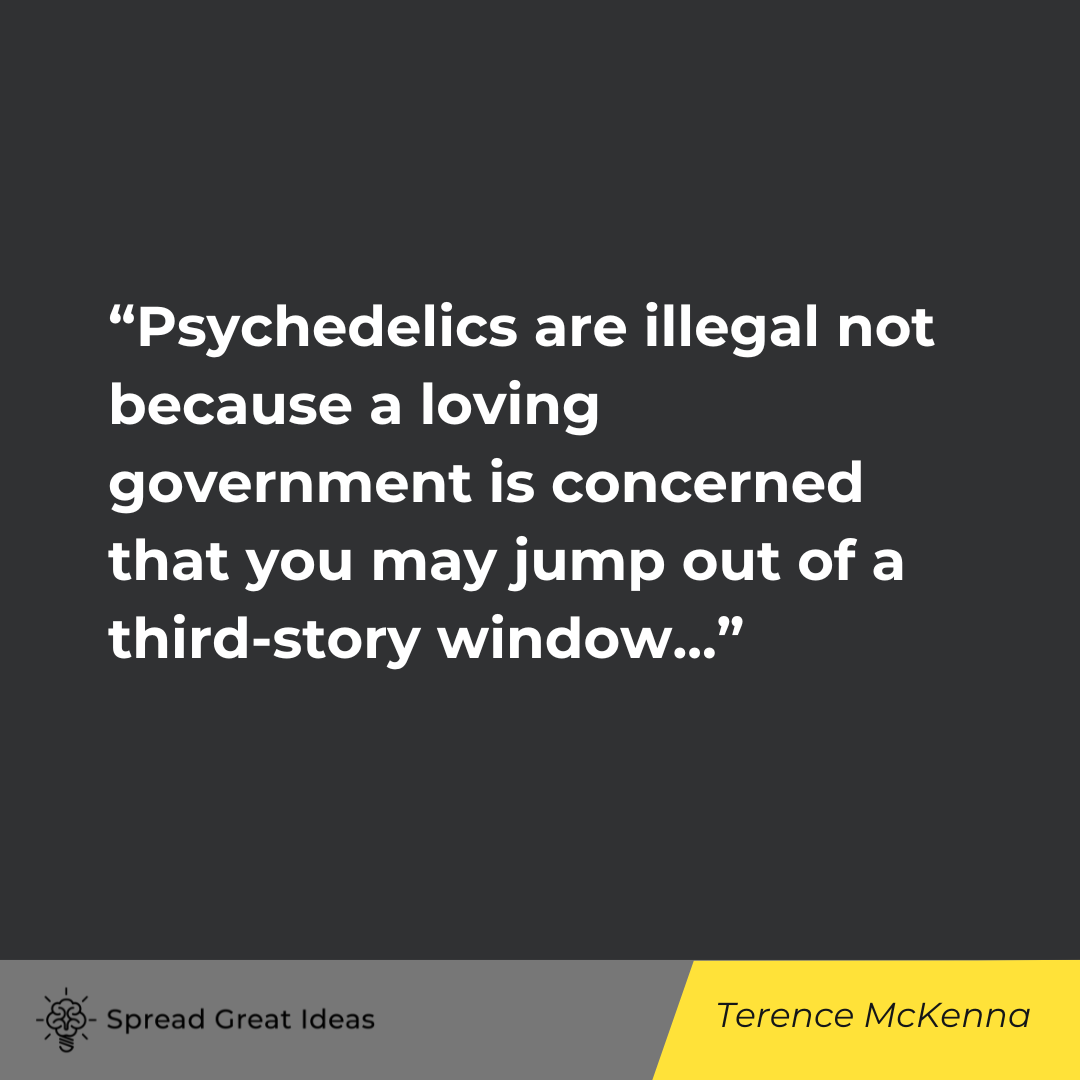
Terence McKenna’s quote boldly challenges the conventional understanding of why psychedelics are prohibited. He posits that it’s not about physical safety concerns, but rather a fear of their transformative power. McKenna suggests that psychedelics threaten established societal norms by dismantling ingrained belief systems and modes of thought. By transcending cultural conditioning, these substances confront users with the unsettling notion that their perceptions of reality may be flawed. The illegality of psychedelics, McKenna implies, serves to maintain the status quo by suppressing experiences that challenge the foundations of conventional wisdom, highlighting the potential for radical shifts in consciousness and understanding.
Joseph Campbell
“The LSD phenomenon, on the other hand, is – to me at least – more interesting. It is an intentionally achieved schizophrenia, with the expectation of a spontaneous remission – which, however, does not always follow. Yoga, too, is intentional schizophrenia: one breaks away from the world, plunging inward, and the ranges of vision experienced are in fact the same as those of a psychosis. But what, then, is the difference? What is the difference between a psychotic or LSD experience and a yogic, or a mystical? The plunges are all into the same deep inward sea; of that there can be no doubt. The symbolic figures encountered are in many instances identical (and I shall have something more to say about those in a moment). But there is an important difference. The difference – to put it sharply – is equivalent simply to that between a diver who can swim and one who cannot. The mystic, endowed with native talents for this sort of thing and following, stage by stage, the instruction of a master, enters the waters and finds he can swim; whereas the schizophrenic, unprepared, unguided, and ungifted, has fallen or has intentionally plunged, and is drowning.”
– Joseph Campbell, Myths to Live By
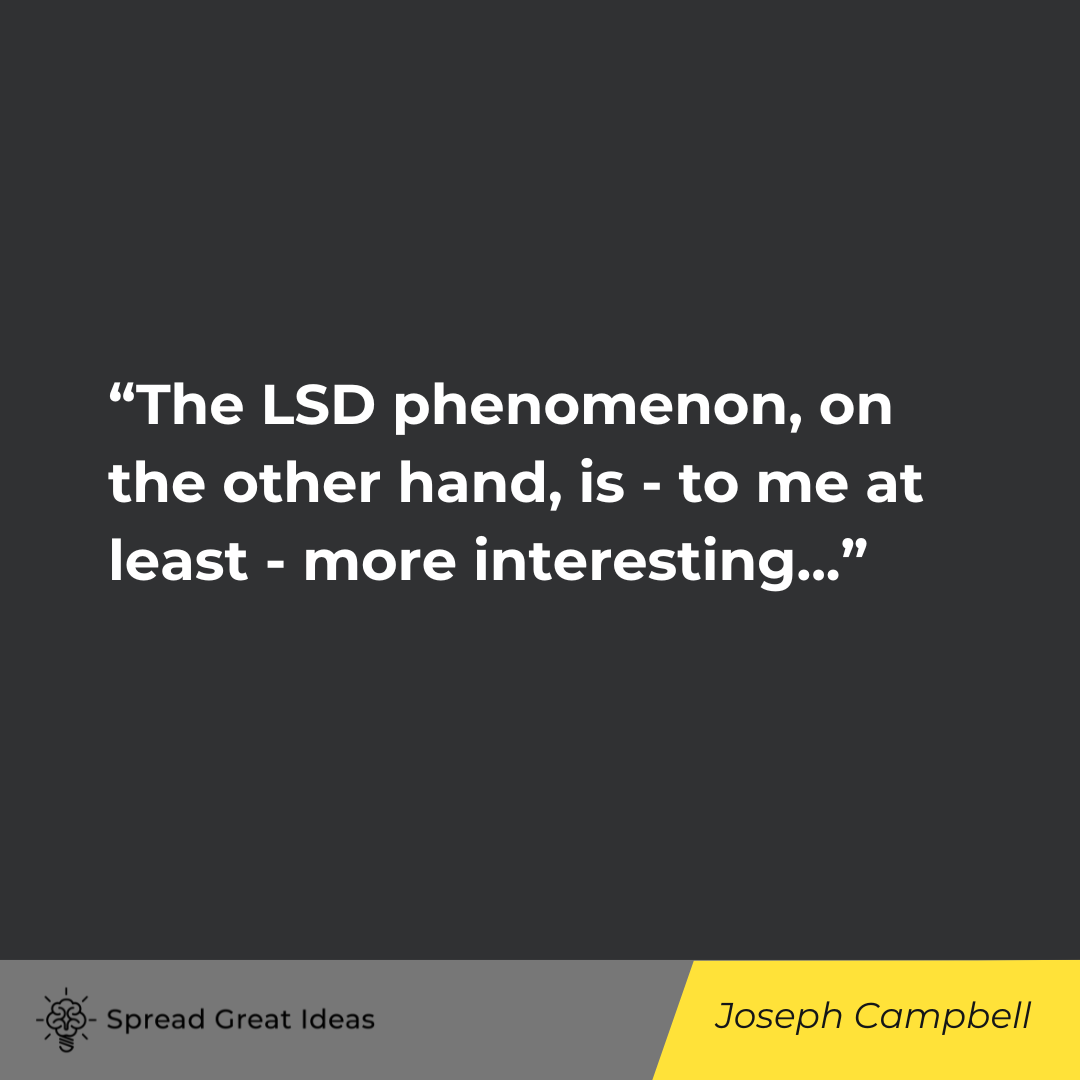
Joseph Campbell’s quote delves into the intriguing comparison between the LSD experience, intentional schizophrenia, and the mystical journeys of yoga. He draws parallels between the inward plunges of these experiences, highlighting the shared symbolism encountered in the depths of consciousness. However, Campbell underscores a crucial distinction: the difference lies in the preparedness and guidance of the individual. While mystics navigate these realms with skill and guidance, those undergoing LSD-induced or psychotic experiences lack preparation and risk drowning in the depths of their psyche. Campbell’s analogy underscores the importance of guidance and readiness in exploring the profound realms of consciousness.
Timothy Leary
“LSD is a psychedelic drug which occasionally causes psychotic behavior in people who have NOT taken it.”
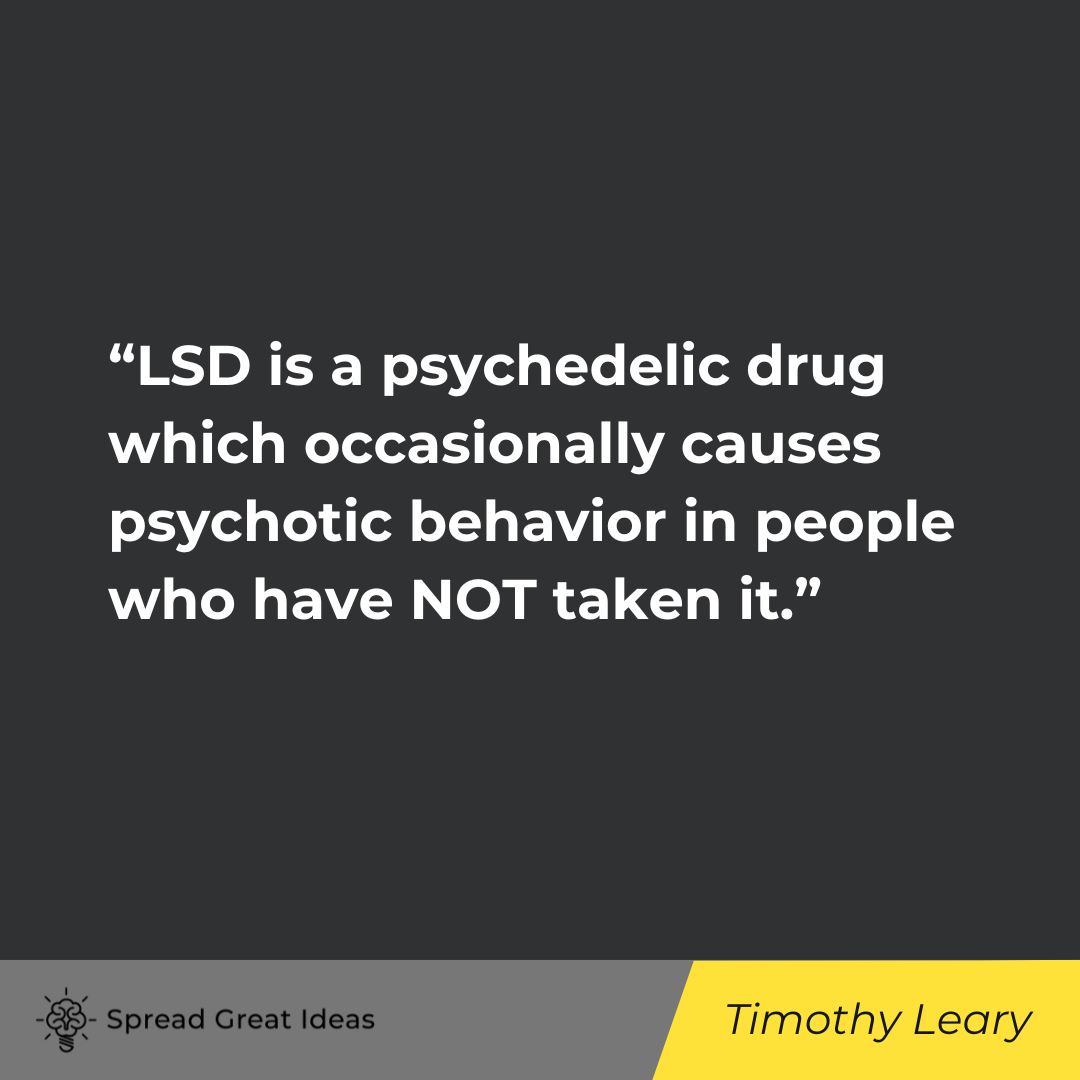
Timothy Leary’s quote provocatively encapsulates the paradoxical reputation of LSD. He suggests that LSD, a psychedelic substance known for inducing altered states of consciousness, can paradoxically trigger psychotic behavior in individuals who haven’t consumed it. This statement challenges conventional assumptions about drug-induced psychosis, hinting at the profound impact of societal perceptions and expectations on mental states. Leary’s assertion invites reflection on the complex interplay between substance use, cultural conditioning, and psychological responses, shedding light on the intricate dynamics shaping our understanding of consciousness and behavior in relation to psychedelic substances.
Timothy Leary
“Turn on, tune in, drop out.”
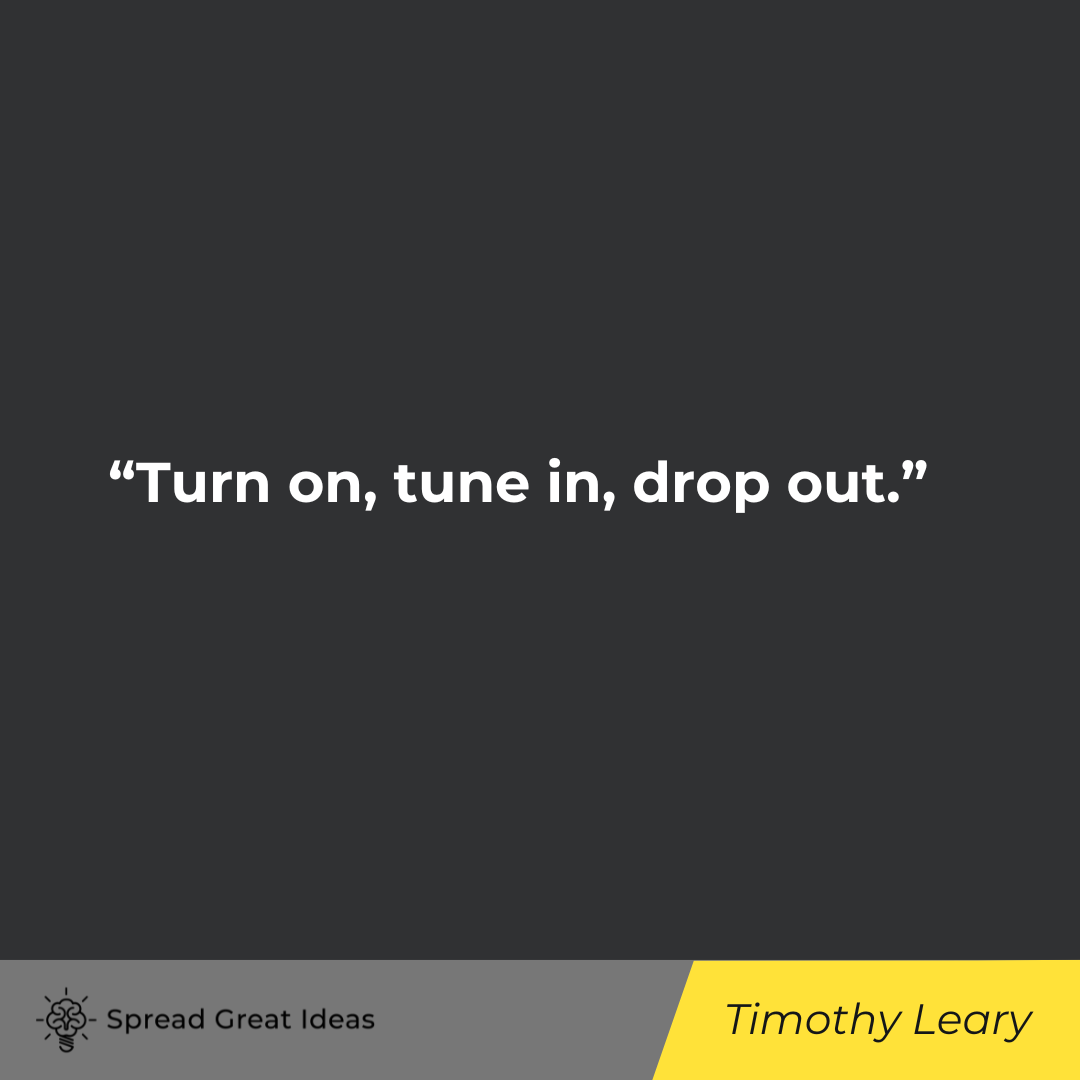
Timothy Leary’s iconic phrase, “Turn on, tune in, drop out,” encapsulates a countercultural ethos of the 1960s. It serves as a rallying cry for individuals to explore altered states of consciousness through psychedelic drugs (“turn on”), to attune themselves to new perspectives and experiences (“tune in”), and ultimately to detach from societal expectations and norms (“drop out”). Leary’s message encourages a reevaluation of traditional values and a pursuit of personal authenticity and freedom. While controversial, it remains a symbol of the era’s quest for expanded consciousness and social change, embodying the spirit of rebellion and self-discovery.
Timothy Leary
“I am 100 percent in favor of the intelligent use of drugs, and 1,000 percent against the thoughtless use of them, whether caffeine or LSD. And drugs are not central to my life.”
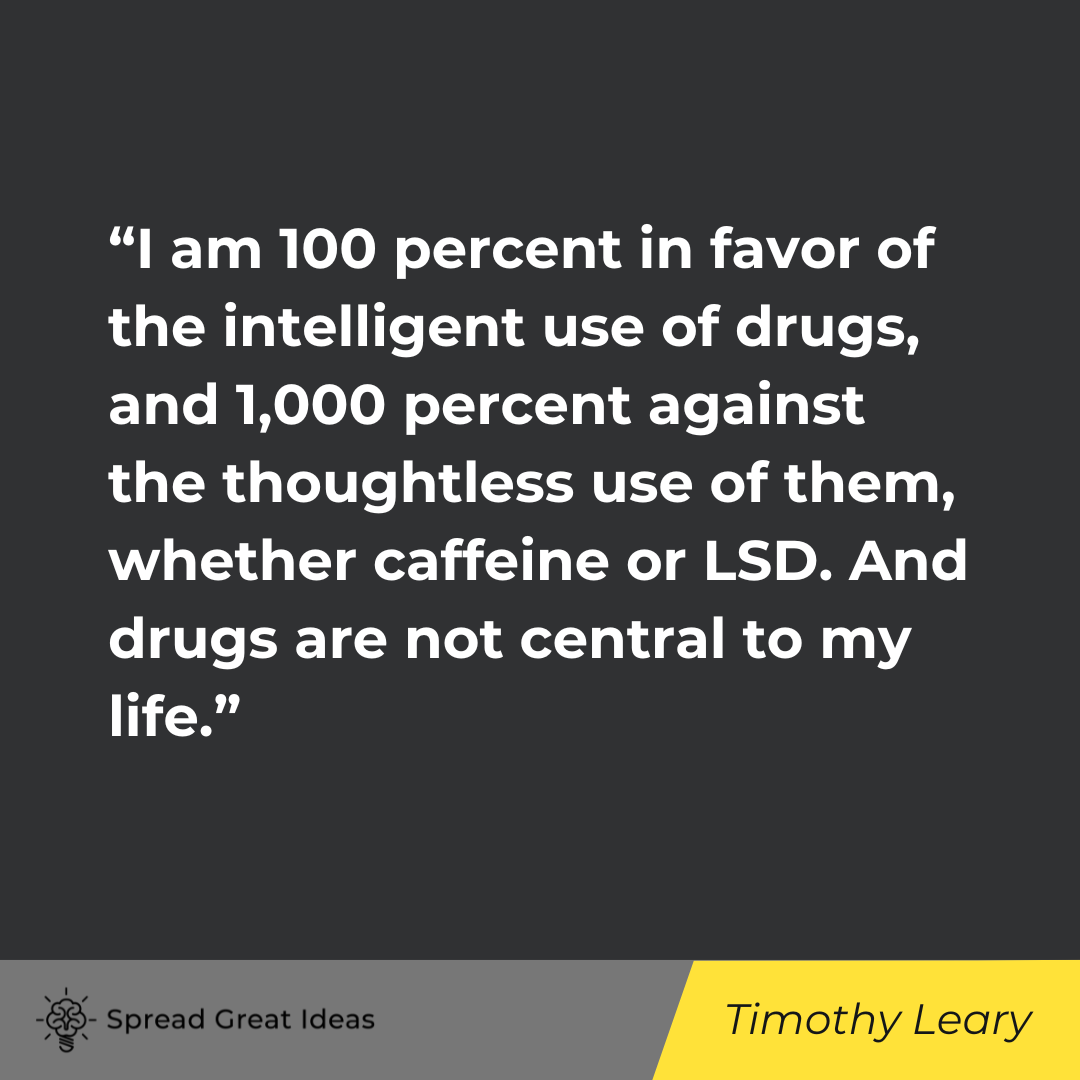
In this quote, Timothy Leary adopts a nuanced stance on drug use, advocating for responsible and mindful consumption while cautioning against reckless behavior. He emphasizes the importance of intelligent use, highlighting that substances like caffeine and LSD can have both beneficial and harmful effects depending on how they are approached. Leary’s statement underscores the need for informed decision-making and moderation, rejecting the notion that drugs should dominate one’s existence. By acknowledging the potential of drugs while also asserting their peripheral role in his life, he promotes a balanced perspective that prioritizes individual autonomy and well-being.
Aldous Huxley
“How odd it is that writers like Belloc and Chesterton may sing the praises of alcohol (which is responsible for about two-thirds of the car accidents and three-quarters of the crimes of violence) and be regarded as good Christians and noble fellows. Whereas anyone who ventures to suggest that there may be other and less harmful shortcuts to self-transcendence is treated as a dangerous drug fiend and wicked perverter of weak-minded humanity.”
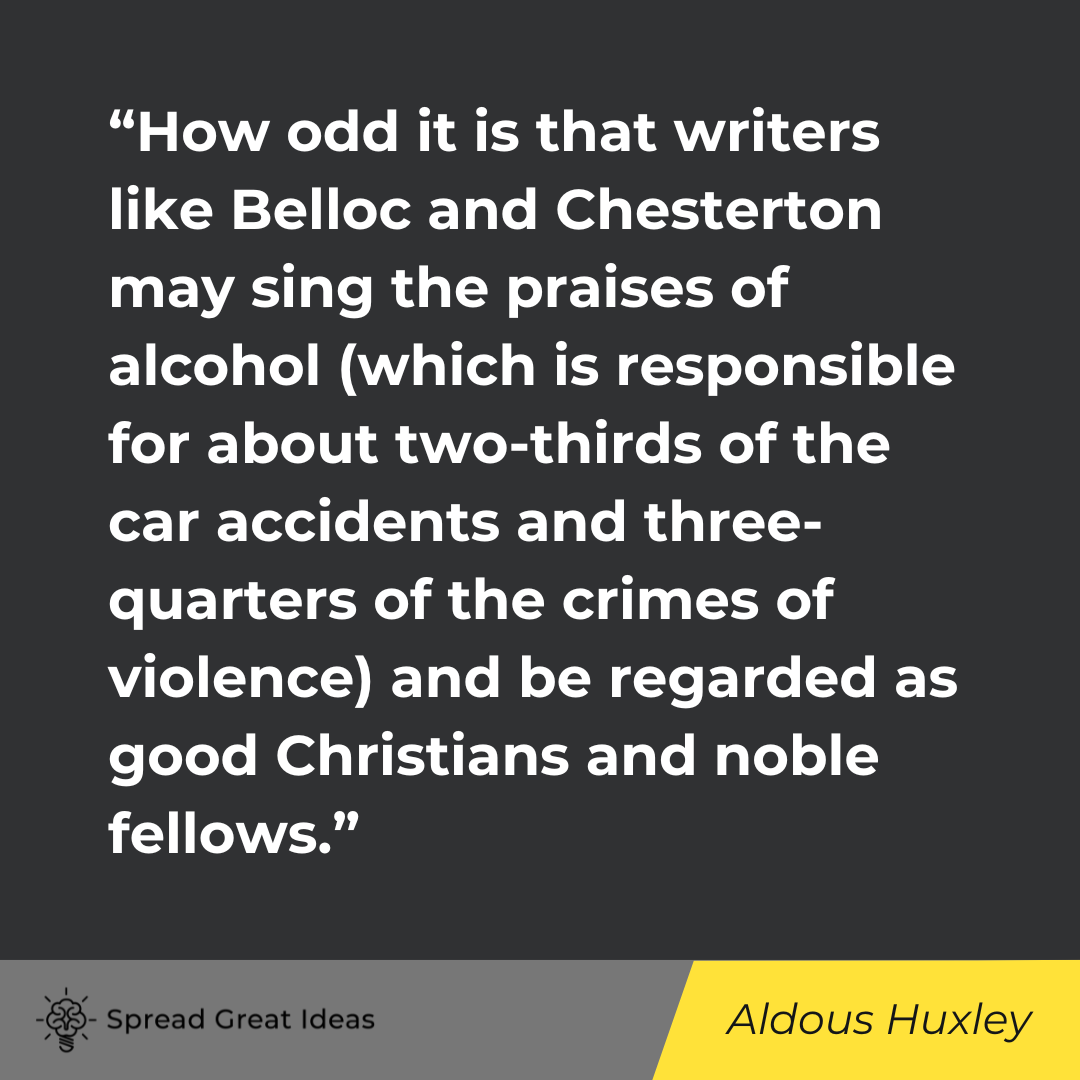
Aldous Huxley’s quote critically examines societal attitudes toward substance use, particularly contrasting the acceptance of alcohol with the stigma surrounding other methods of self-transcendence, such as psychedelics. Huxley questions the inconsistency in how individuals who praise alcohol are often esteemed, while those advocating for alternative paths to self-discovery are condemned. He highlights the double standard and prejudice embedded in these perceptions, emphasizing the need for a more nuanced and open-minded approach to exploring consciousness. Huxley challenges the societal norms that demonize certain substances while glorifying others, calling for a reevaluation of our collective understanding of mind-altering experiences.
Steve Jobs
“Taking LSD was a profound experience, one of the most important things in my life. LSD shows you that there’s another side to the coin, and you can’t remember it when it wears off, but you know it. It reinforced my sense of what was important—creating great things instead of making money, putting things back into the stream of history and of human consciousness as much as I could.”
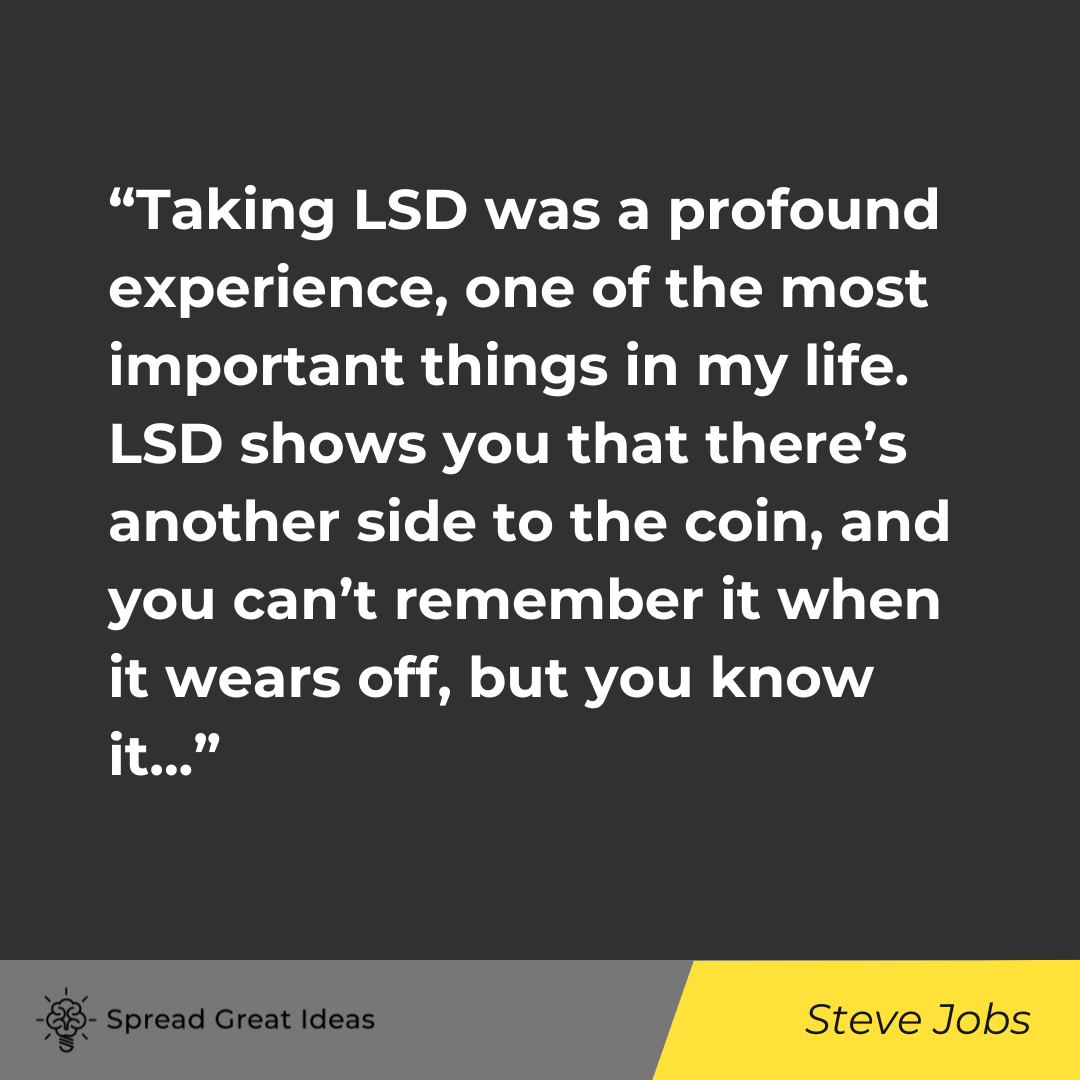
Steve Jobs’ reflection on his experience with LSD offers insight into the profound impact it had on his worldview and priorities. He describes it as a pivotal moment, revealing an alternative perspective that transcended the mundane and materialistic. LSD, Jobs suggests, unveils a deeper truth beyond everyday perception, fostering a heightened awareness of creativity and human connection. For Jobs, this insight reinforced his commitment to innovation and meaningful contribution, prioritizing the pursuit of greatness over mere financial gain. His words underscore the transformative potential of psychedelic experiences in shaping one’s values and aspirations, illuminating a path towards purposeful living and cultural evolution.
Alan Moore
“LSD was an incredible experience. Not that I’m recommending it for anybody else; but for me, it kind of it hammered home to me that reality was not a fixed thing. That the reality that we saw about us every day was one reality, and a valid one but that there were others, different perspectives where different things have meaning that was just as valid. That had a profound effect on me.”
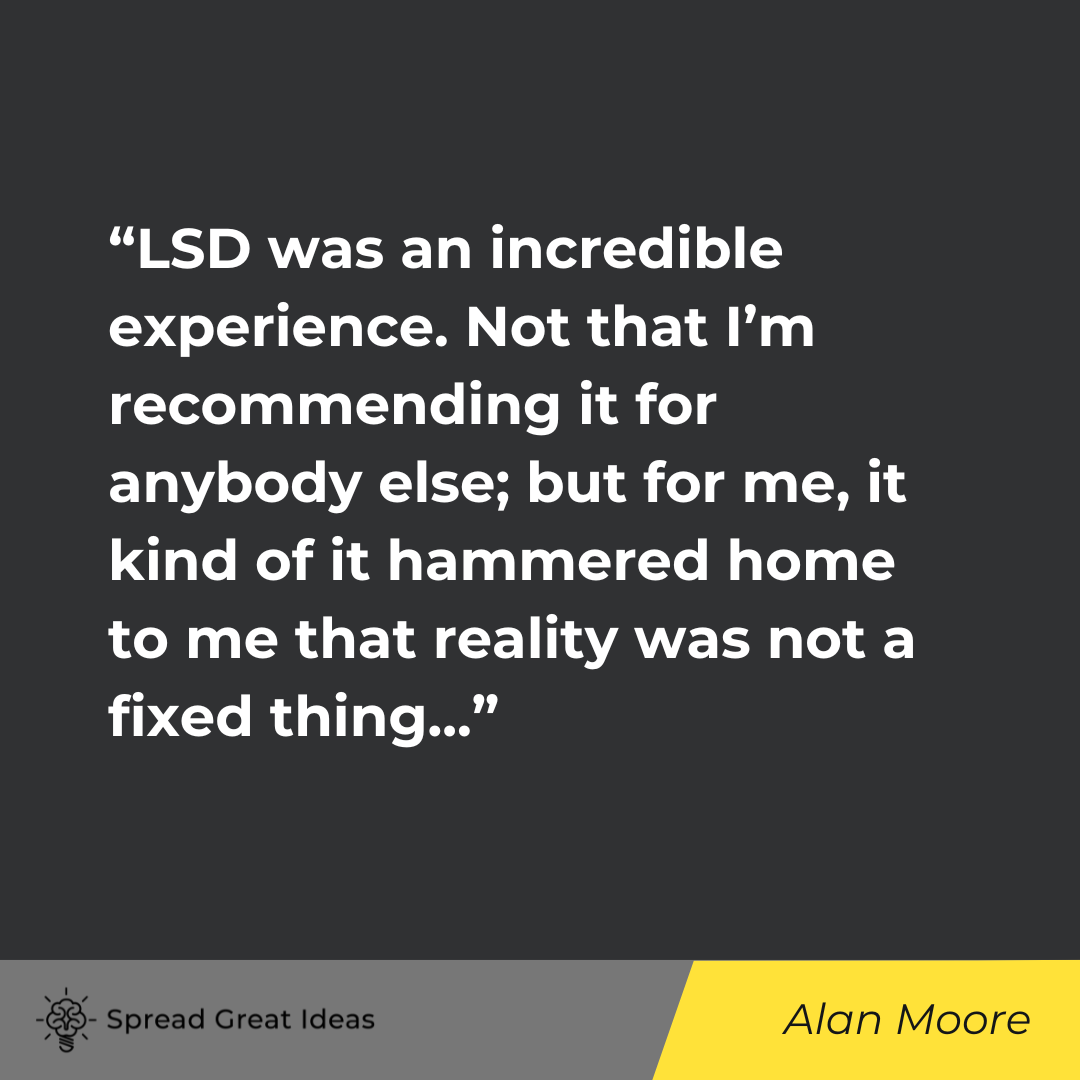
Alan Moore reflects on his experience with LSD, acknowledging its profound impact on his perception of reality. He doesn’t advocate for its use but emphasizes its role in revealing the fluidity and multiplicity of existence. Moore suggests that while the reality we perceive daily holds validity, LSD opens doors to alternate perspectives where meanings shift and expand. This revelation, he implies, reshaped his understanding of the world, fostering a deeper appreciation for diverse interpretations and truths. Moore’s words highlight the transformative potential of psychedelic experiences in challenging ingrained perceptions and illuminating the boundless complexity of reality.
Terence McKenna
“Life lived in the absence of the psychedelic experience that primordial shamanism is based on is life trivialized, life denied, life enslaved to the ego.”
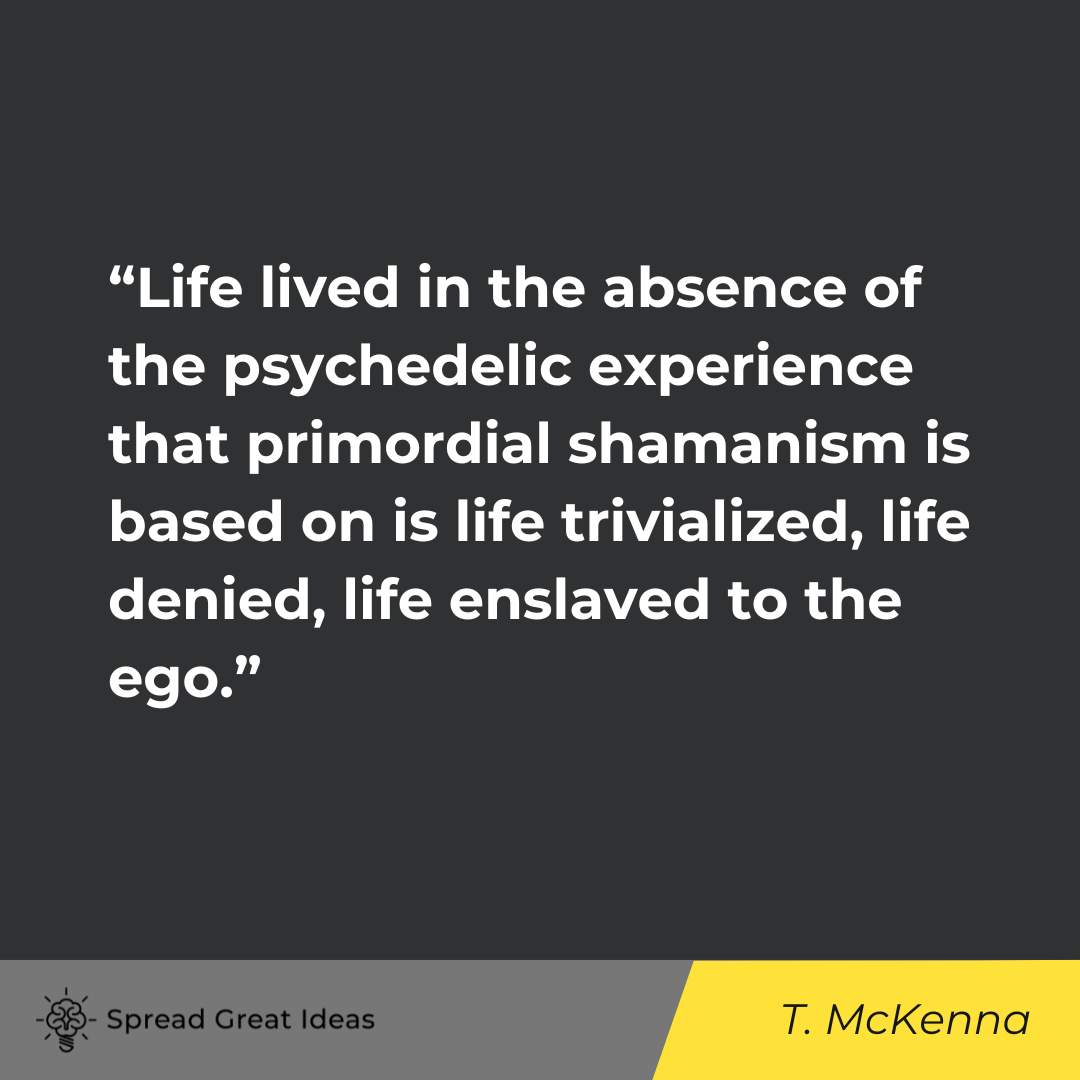
Terence McKenna’s quote encapsulates the profound importance he assigns to the psychedelic experience in the human journey. He suggests that a life devoid of such experiences is limited, reduced to a mere shadow of its potential. McKenna evokes the primal wisdom of shamanic traditions, implying that without accessing altered states of consciousness, individuals are confined by narrow perceptions and ego-driven desires. By contrast, embracing psychedelics offers liberation from this egoic confinement, allowing for a deeper connection to the universe and one’s true essence. McKenna’s words urge a reevaluation of life’s purpose, advocating for the transformative power of psychedelic exploration in enriching human existence.
Quotes About Mysticism and Ego Loss
Jennifer Sodini
“Lao Tzu once said, ‘Nature doesn’t hurry, yet everything is accomplished.'”
“A single seed planted, eventually becomes a garden in time -when things get tough, tend to the garden in your mind.”

Jennifer Sodini’s quote beautifully encapsulates the wisdom of Lao Tzu’s teachings and the power of cultivating inner resilience. By invoking Lao Tzu’s insight about the unhurried yet purposeful rhythm of nature, Sodini emphasizes the importance of patience and perseverance in facing life’s challenges. She likens the mind to a garden, where nurturing thoughts and intentions can lead to growth and abundance over time. In moments of adversity, Sodini suggests tending to this inner garden, nurturing positivity and mindfulness to foster resilience and eventual transformation. Her words inspire a harmonious approach to navigating life’s trials, rooted in the timeless wisdom of nature’s cycles.
Aldous Huxley
“It’s a very salutary thing to realize that the rather dull universe in which most of us spend most of our time is not the only universe there is. I think it’s healthy that people should have this experience.”
– Aldous Huxley, Moksha: Writings on Psychedelics & the Visionary Experience
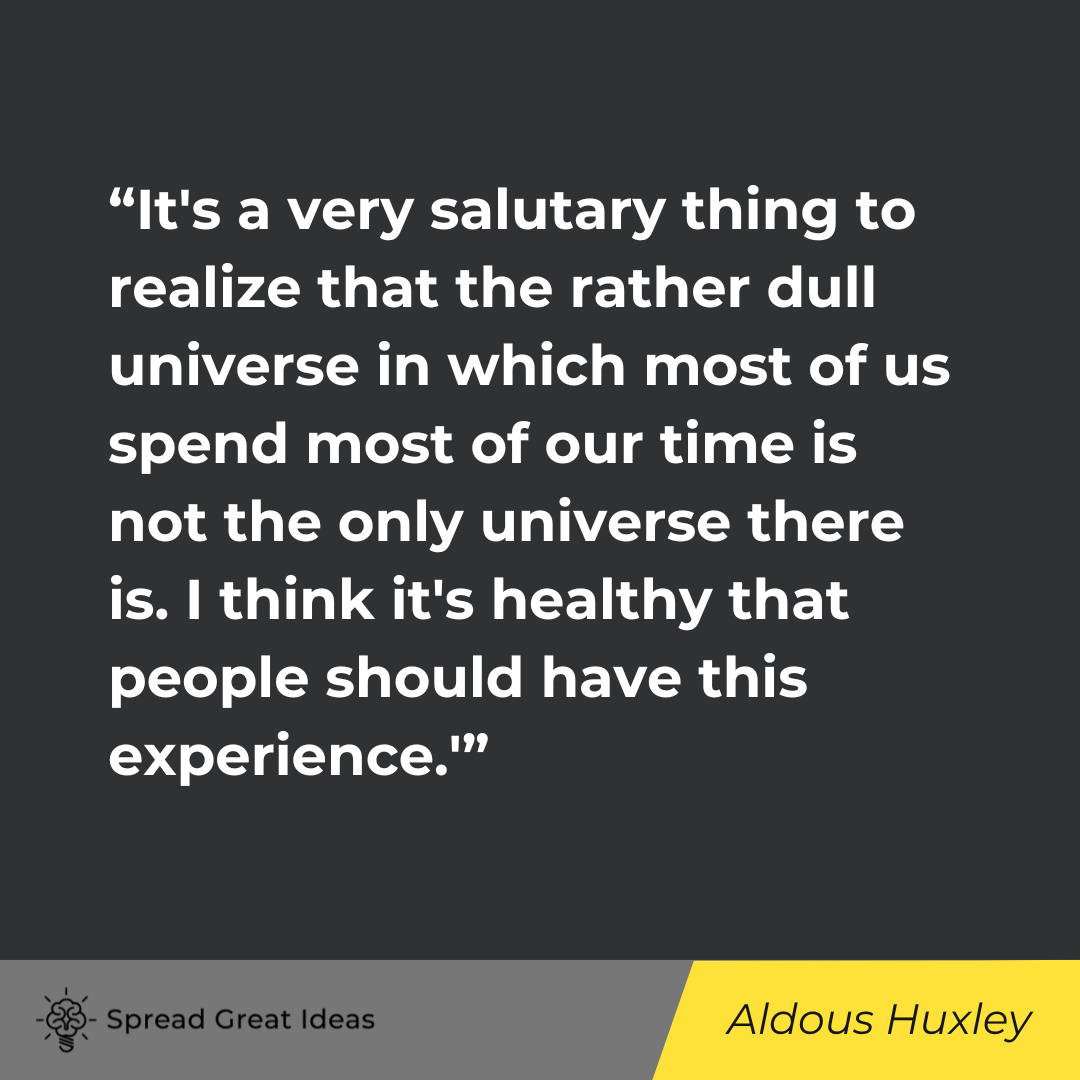
Aldous Huxley’s quote underscores the transformative potential of transcendent experiences, particularly through psychedelics. He suggests that realizing the limitations of our mundane perceptions can open the door to alternate realms of existence. Huxley views these experiences as essential for broadening one’s understanding of reality, promoting mental and spiritual well-being. By embracing the notion of multiple universes beyond the ordinary, individuals can cultivate a more expansive perspective, fostering personal growth and a deeper connection to the mysteries of existence. Huxley’s words advocate for embracing the extraordinary and exploring the boundless possibilities of consciousness, enriching the human experience.
Aldous Huxley
“The man who comes back through the Door in the Wall will never be quite the same as the man who went out. He will be wiser but less sure, happier but less self-satisfied, humbler in acknowledging his ignorance yet better equipped to understand the relationship of words to things, of systematic reasoning to the unfathomable mystery which he tries, forever vainly, to comprehend.”
– Aldous Huxley, The Doors of Perception

In Aldous Huxley’s quote from “The Doors of Perception,” he poetically captures the transformative journey of those who explore altered states of consciousness. The metaphorical “Door in the Wall” symbolizes the gateway to profound insights and expanded awareness. Huxley suggests that those who return from this journey undergo a profound shift, gaining wisdom while humbly acknowledging the limits of understanding. They become more attuned to the complexities of existence, recognizing the interplay between language, reason, and the ineffable mysteries of life. Huxley’s words illuminate the transformative power of inner exploration, inviting reflection on the profound changes that accompany expanded consciousness.
Aldous Huxley
“Unitive knowledge of God is possible only to those who ‘have ceased to cherish opinions’ even opinions that are as true as it is possible for verbalized abstractions to be.”
– Aldous Huxley, The Perennial Philosophy
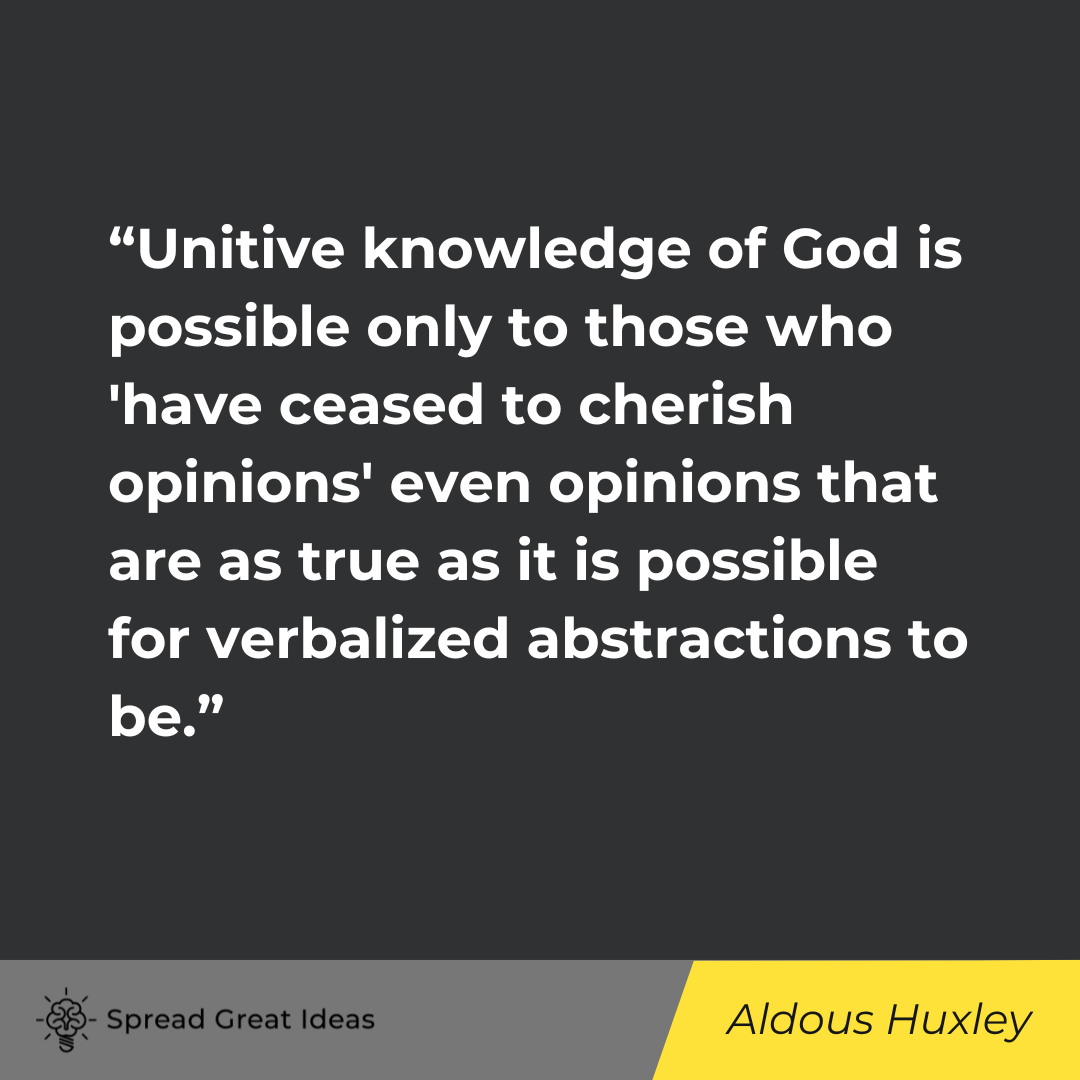
In “The Perennial Philosophy,” Aldous Huxley delves into the nature of spiritual enlightenment, emphasizing the necessity of transcending mental constructs to attain a unitive understanding of the divine. He suggests that true insight into the nature of God requires letting go of all preconceived notions, even those that may align with truth to some extent. By relinquishing attachment to beliefs and embracing a state of open receptivity, individuals can achieve a deeper connection to the divine essence. Huxley’s words underscore the importance of humility and surrender in the pursuit of spiritual wisdom, emphasizing the liberation found in transcending the limitations of conceptual thought.
Albert Hoffmann
“There are experiences that most of us are hesitant to speak about, because they do not conform to everyday reality and defy rational explanation. These are not particular external occurrences, but rather events of our inner lives, which are generally dismissed as figments of the imagination and barred from our memory. Suddenly, the familiar view of our surroundings is transformed in a strange, delightful, or alarming way: it appears to us in a new light, takes on a special meaning. Such an experience can be as light and fleeting as a breath of air, or it can imprint itself deeply upon our minds.”
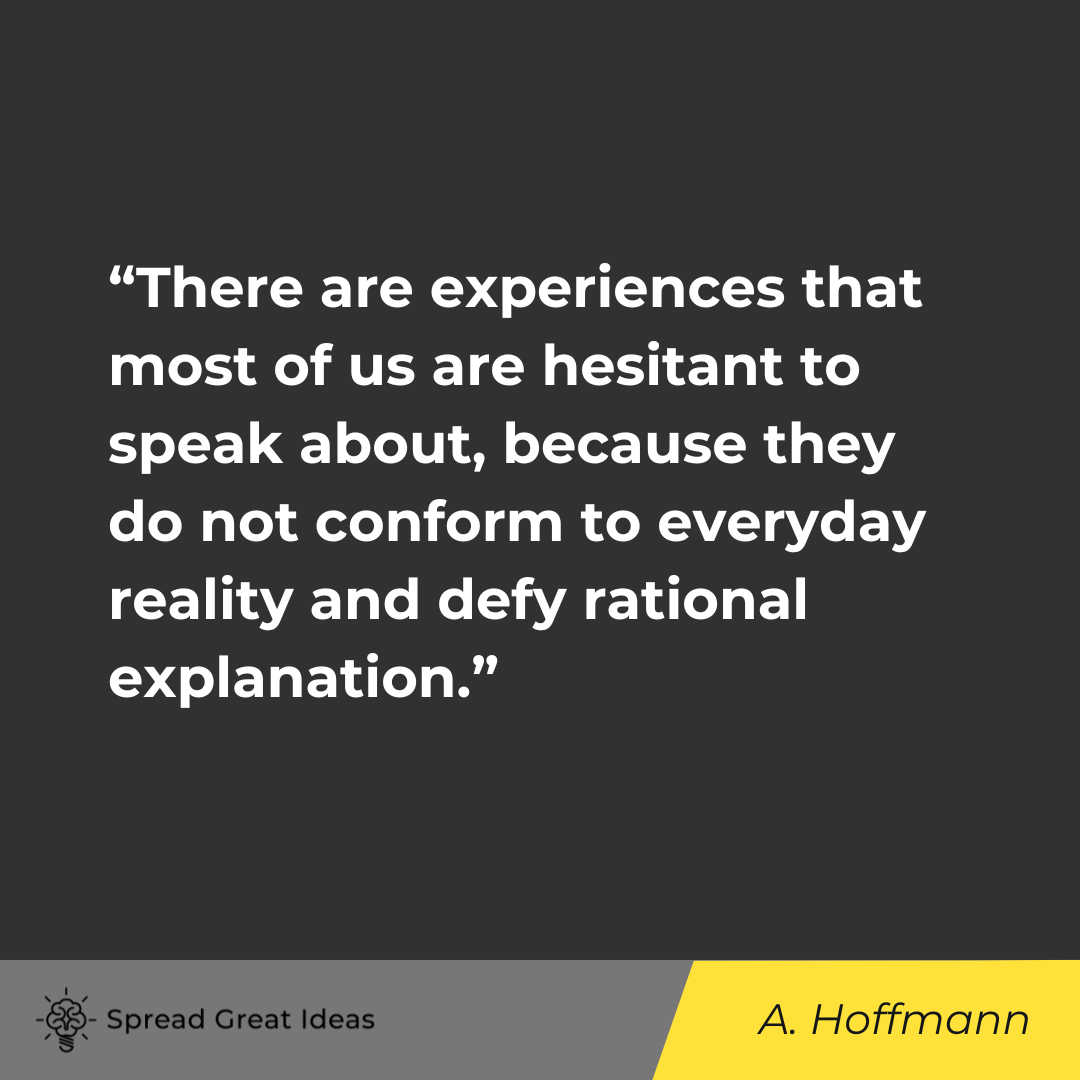
Albert Hofmann’s quote poetically explores the enigmatic nature of inner experiences that defy conventional understanding. He suggests that these encounters, often dismissed as mere products of imagination, hold profound significance in shaping our perception of reality. Whether fleeting or deeply impactful, these moments offer glimpses into alternate realms of consciousness, where the mundane becomes imbued with extraordinary significance. Hofmann’s words evoke a sense of wonder and mystery, inviting reflection on the hidden dimensions of human existence and the transformative power of inner exploration. His insight challenges us to embrace the richness of subjective experience beyond the confines of rational explanation.
Albert Hoffmann
“When you study natural science and the miracles of creation, if you don’t turn into a mystic you are not a natural scientist.”
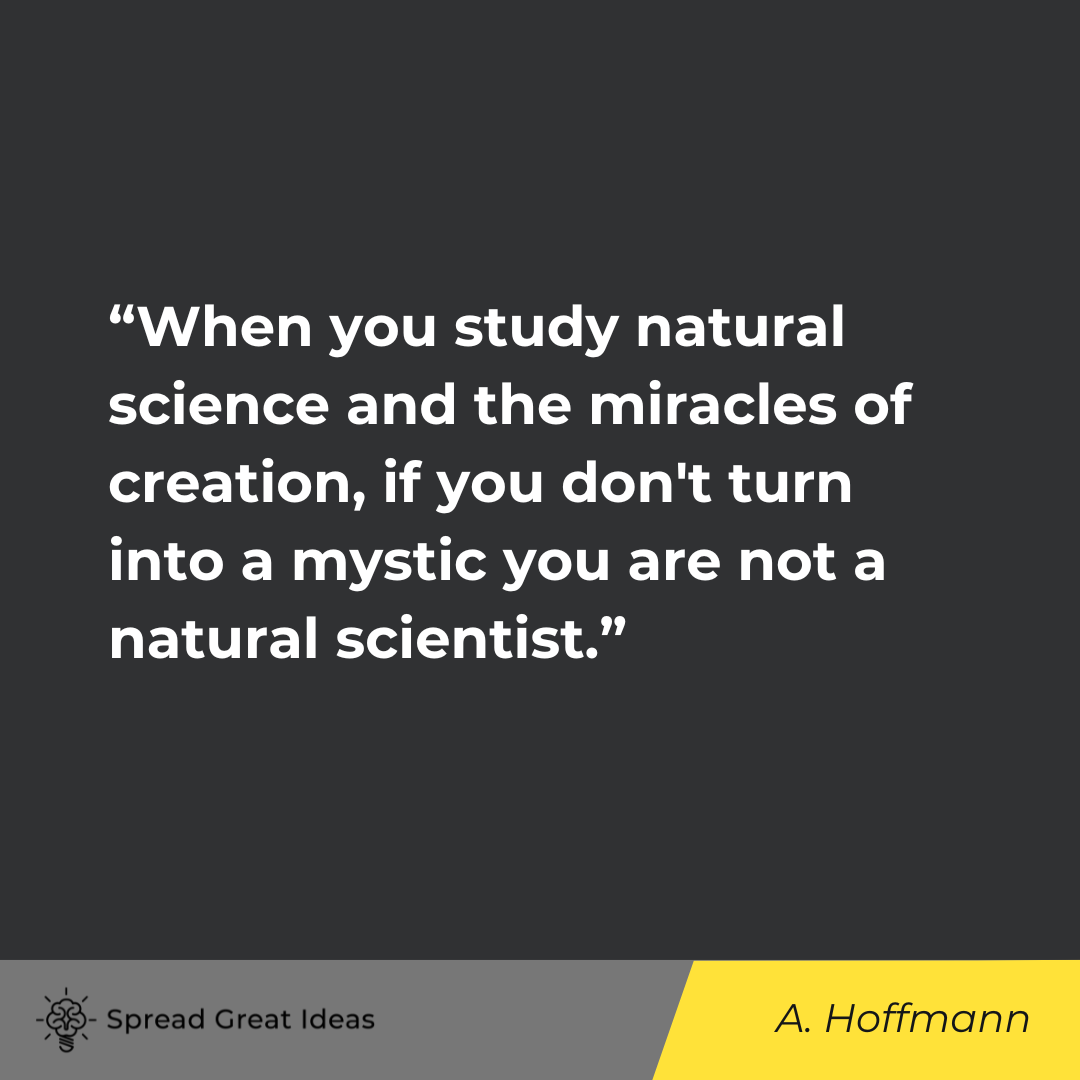
Albert Hofmann’s quote underscores the profound connection between scientific inquiry and spiritual insight. He suggests that studying the intricate wonders of nature inevitably leads to a deeper appreciation and reverence for the mysteries of creation. Hofmann implies that true natural scientists don’t just observe the outer workings of the universe but also perceive its underlying beauty and complexity with a sense of awe and wonder akin to mysticism. By acknowledging the spiritual dimension inherent in scientific exploration, Hofmann challenges the dichotomy between science and mysticism, advocating for a holistic understanding that integrates both empirical observation and transcendent experience.
Meister Eckhart
“The eye through which I see God is the same eye through which God sees me; my eye and God’s eye are one eye, one seeing, one knowing, one love.”

Meister Eckhart’s quote poignantly captures the essence of mystical union and interconnectedness with the divine. He metaphorically equates the human perception of God with God’s perception of humanity, emphasizing the oneness of consciousness and the unity of being. Eckhart suggests that the same divine presence that perceives the world also resides within each individual, creating a shared experience of divine love and understanding. Through this profound insight, Eckhart invites contemplation on the inherent unity between the individual soul and the divine, transcending the boundaries of perception and revealing the boundless nature of spiritual connection.
Bram Stoker
“Do you not think that there are things which you cannot understand, and yet which are; that some people see things that others cannot? But there are things old and new which must not be contemplate by men´s eyes, because they know -or think they know- some things which other men have told them. Ah, it is the fault of our science that it wants to explain all; and if it explain not, then it says there is nothing to explain.”
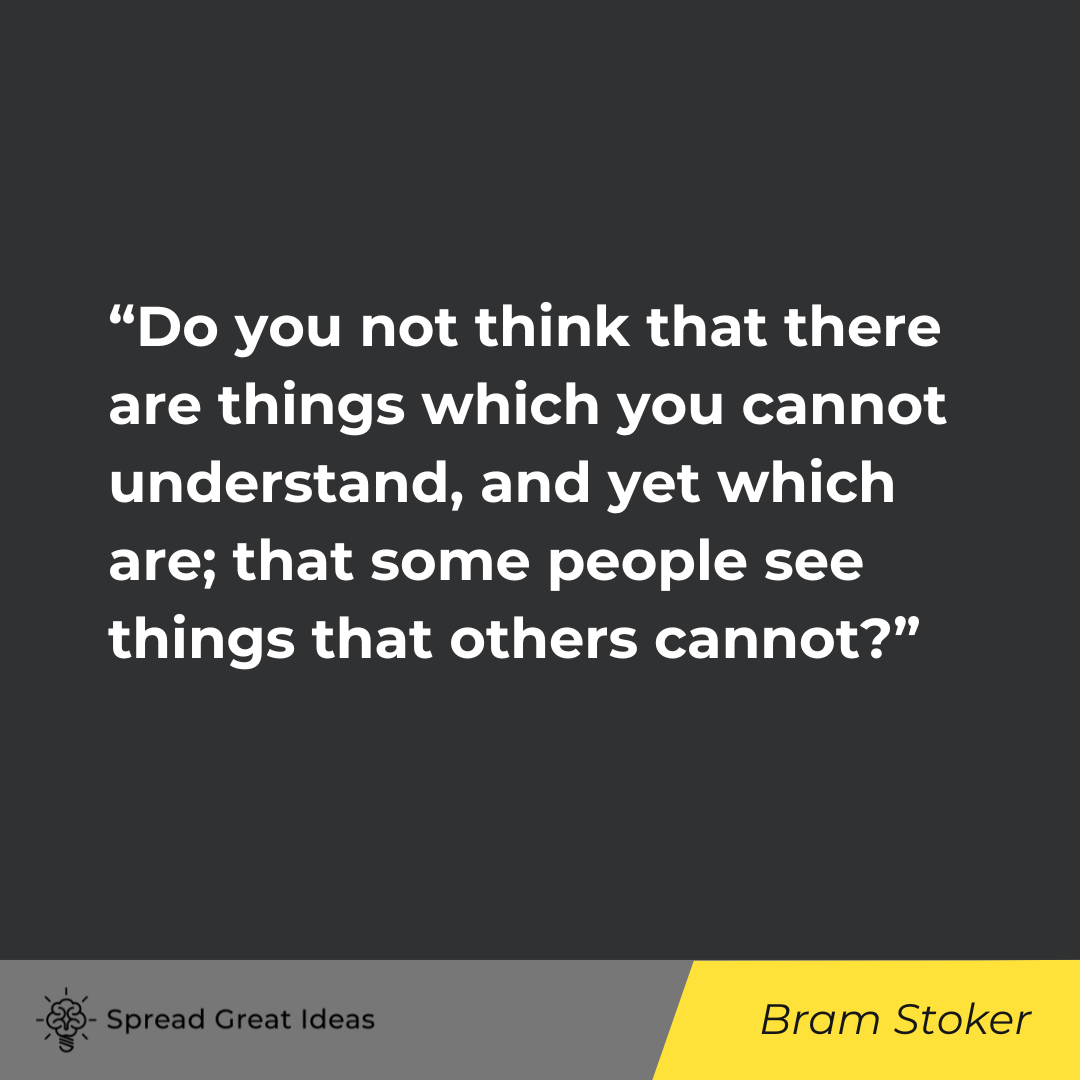
Bram Stoker, through the character in “Dracula,” challenges the limits of human comprehension and the arrogance of scientific reductionism. He suggests that there exist phenomena beyond our understanding, witnessed by some but dismissed by others due to societal conditioning or intellectual arrogance. Stoker critiques the narrow-mindedness of science, which seeks to explain everything and disregards that which eludes explanation. He implies that this refusal to acknowledge the unknown limits our perception and denies the existence of mysteries beyond empirical understanding. Stoker’s words caution against the hubris of assuming mastery over all knowledge, urging humility in the face of the ineffable.
G.K. Chesterton
“Surely we cannot take an open question like the supernatural and shut it with a bang, turning the key of the madhouse on all the mystics of history. You cannot take the region of the unknown and calmly say that, though you know nothing about it, you know all the gates are locked. We do not know enough about the unknown to know that it is unknowable.”
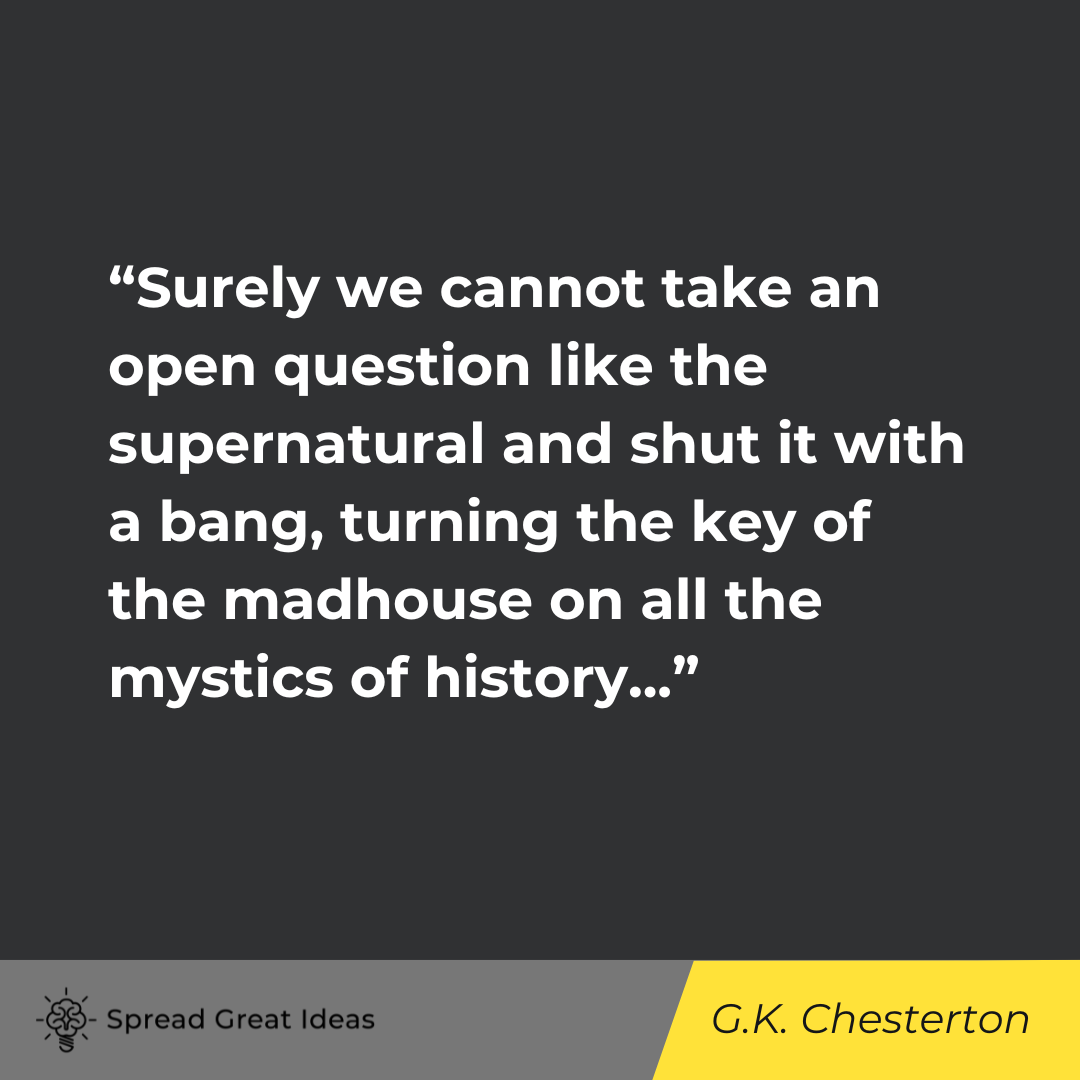
G.K. Chesterton’s quote elegantly challenges the inclination to dismiss the supernatural or the mysterious as mere delusion. He argues against the arrogance of asserting certainty about the unknown, emphasizing the limitations of human knowledge. Chesterton suggests that labeling mystics as mad or confining the supernatural to the realm of insanity overlooks the vastness of what lies beyond our comprehension. He advocates for humility in the face of the unknown, urging recognition of the inadequacy of our understanding. Chesterton’s words compel us to remain open-minded and curious, acknowledging the vastness of existence beyond our grasp.
Timothy Leary
“The goals of an intelligent life, according to Socrates, is to pursue the philosophic quest – to increase one’s knowledge of self and world.”
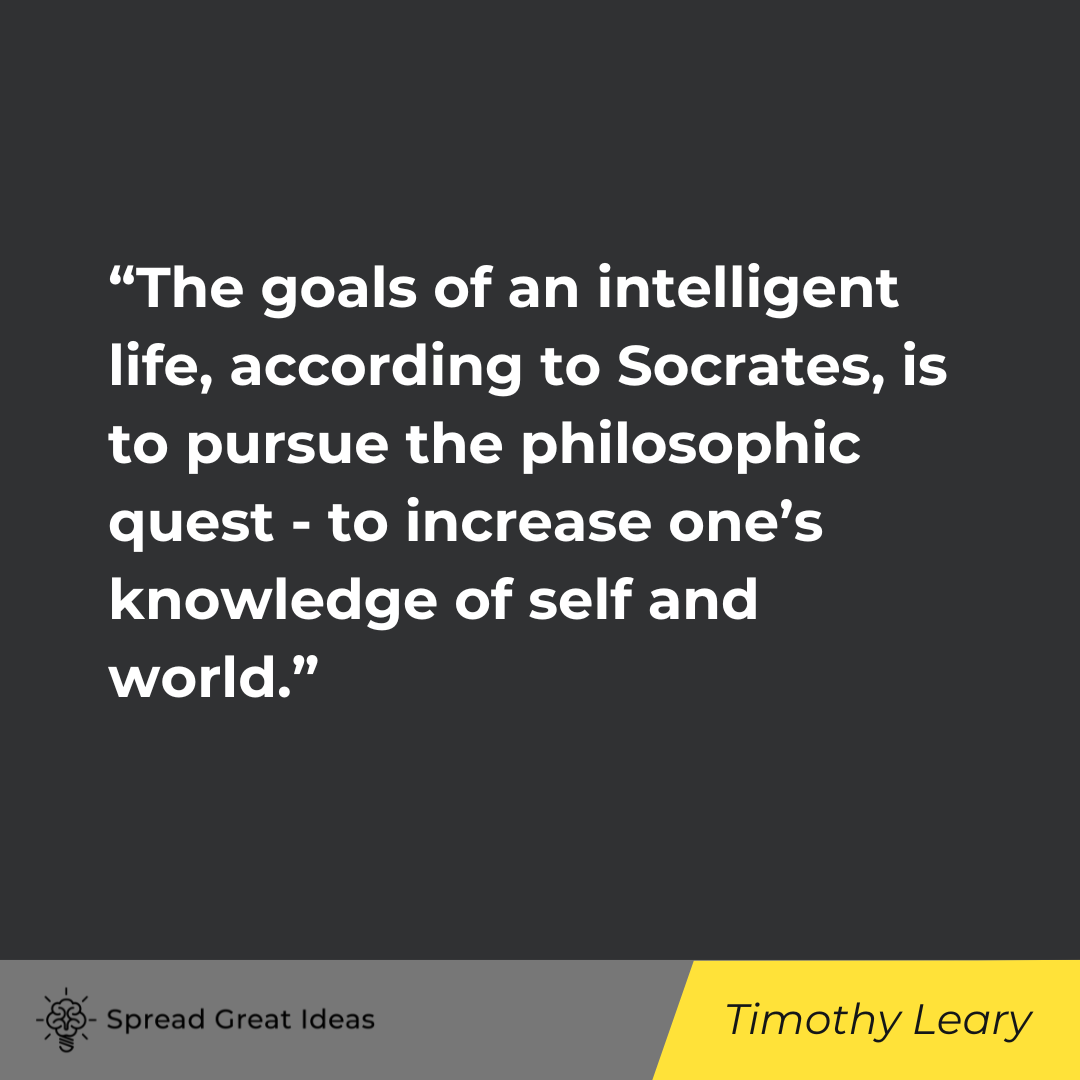
Timothy Leary succinctly encapsulates Socrates’ philosophical ethos, emphasizing the pursuit of wisdom and self-awareness as the primary objectives of human existence. By echoing Socrates’ belief in the importance of the philosophic quest, Leary underscores the value of introspection and intellectual exploration in shaping a meaningful life. He suggests that true intelligence lies not only in acquiring external knowledge but also in delving deep into the mysteries of one’s own nature and the world at large. Leary’s interpretation highlights the timeless relevance of Socratic principles, advocating for a life dedicated to continuous growth, self-discovery, and enlightenment.
Henri J.M. Nouwen
“Mysticism and revolution are two aspects of the same attempt to bring about radical change. Mystics cannot prevent themselves from becoming social critics, since in self-reflection they will discover the roots of a sick society. Similarly, revolutionaries cannot avoid facing their own human condition, since in the midst of their struggle for a new world they will find that they are also fighting their own reactionary fears and false ambitions.”
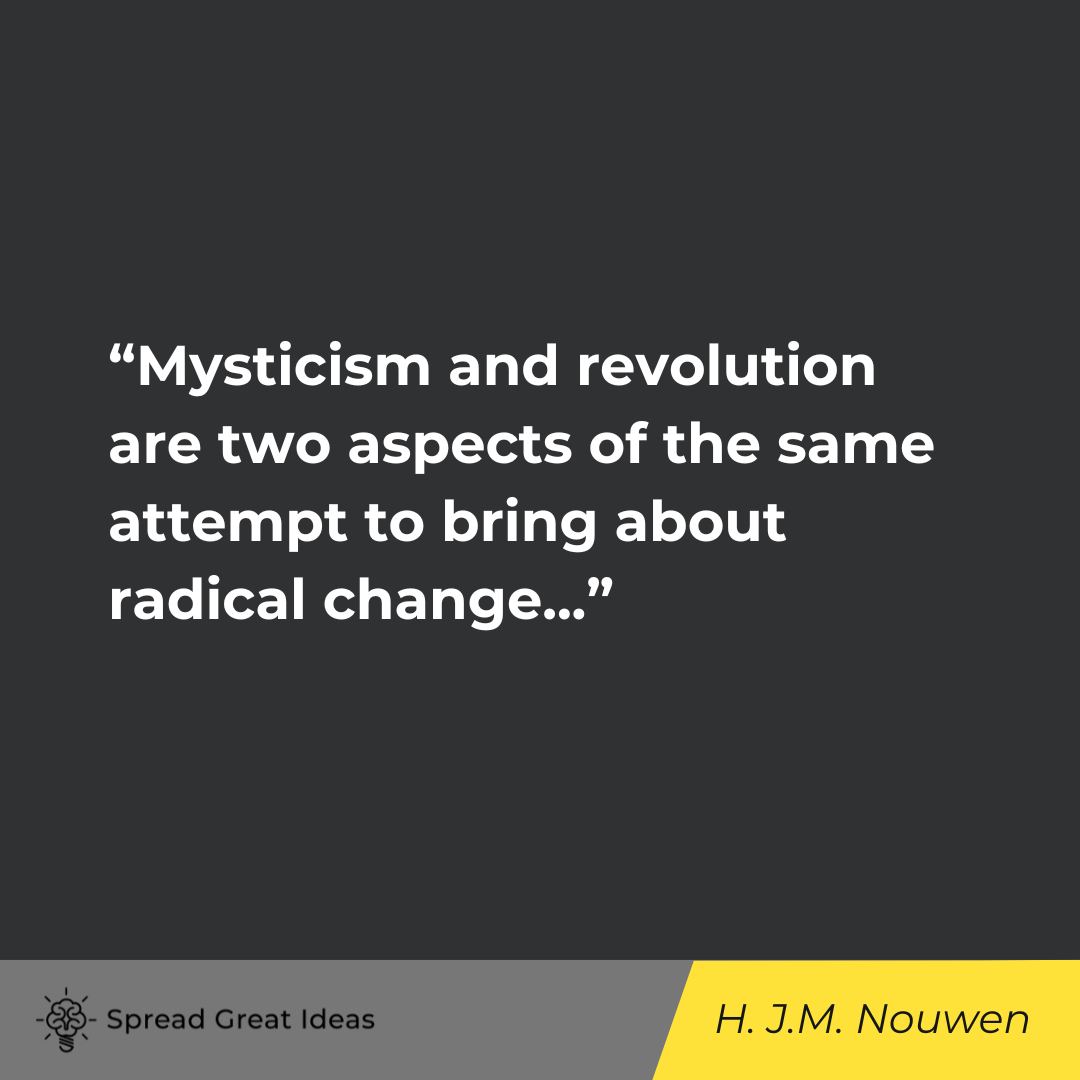
Henri J.M. Nouwen intertwines mysticism and revolution as parallel paths towards transformative change. He suggests that mystics, through introspection, inevitably critique societal ills, recognizing their roots within themselves. Similarly, revolutionaries, amidst their fight for societal change, confront personal limitations and biases. Nouwen posits that both journeys involve a profound examination of the human condition, intertwining external and internal transformation. Mysticism reveals societal maladies, while revolution forces individuals to confront personal shortcomings. Through this synthesis, Nouwen underscores the interconnectedness of personal and societal change, advocating for holistic approaches that acknowledge the reciprocal relationship between the individual and society.
Alexander Shulgin
“There is a wealth of information built into us…tucked away in the genetic material in every one of our cells…without some means of access, there is no way even to begin to guess at the extent and quality of what is there. The psychedelic drugs allow exploration of this interior world and insights into its nature.”
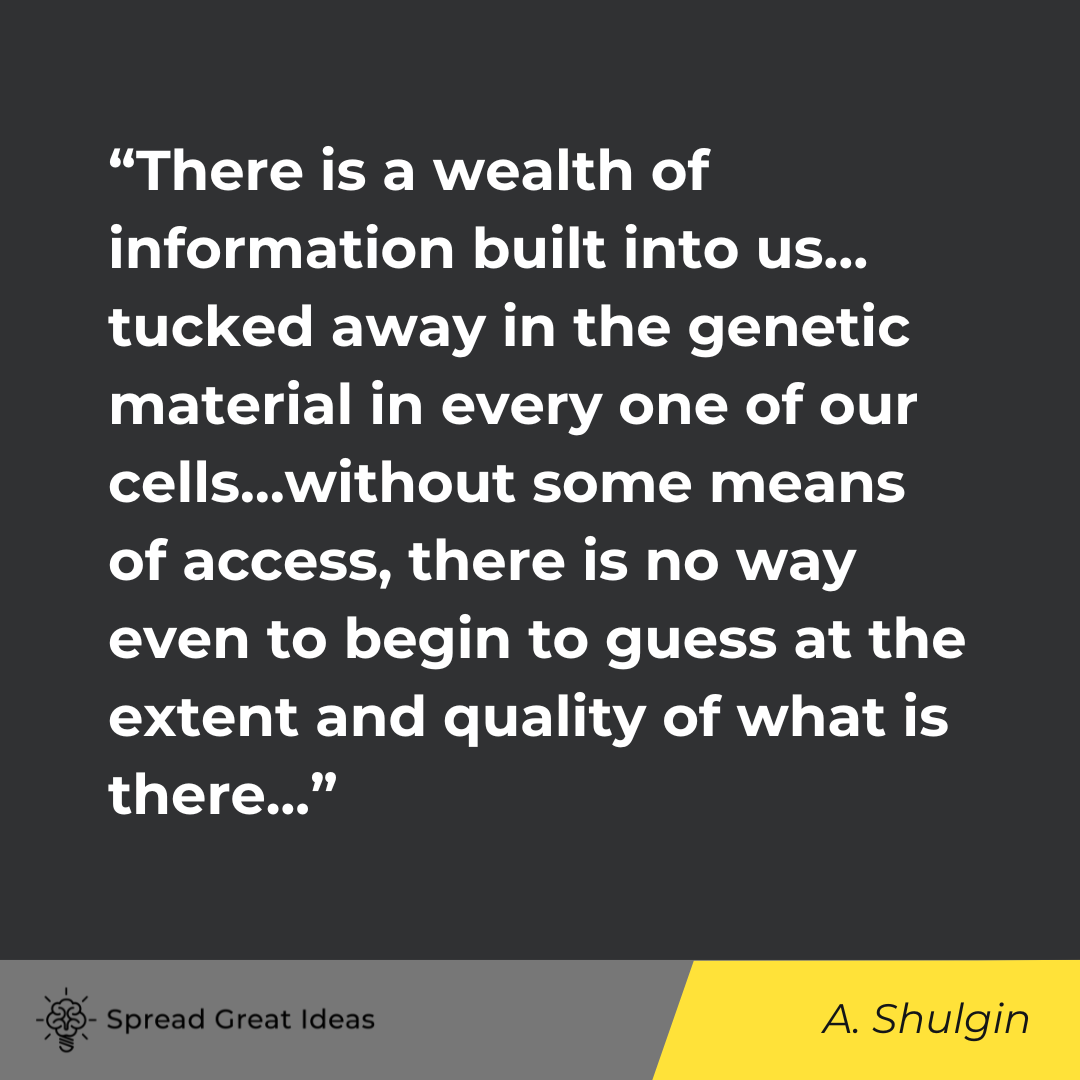
Alexander Shulgin’s quote illuminates the untapped reservoir of knowledge encoded within human genetics. He suggests that within our cells lies a wealth of information inaccessible to ordinary consciousness. Shulgin proposes that psychedelic drugs serve as a key to unlock this hidden realm, enabling exploration and revelation of our genetic inheritance. Through altered states of consciousness facilitated by psychedelics, individuals gain access to insights about the depths of their being and the mysteries of existence. Shulgin’s perspective highlights the potential for psychedelic exploration to unveil the profound secrets encoded within our biological makeup, offering glimpses into the vast complexities of human existence.
